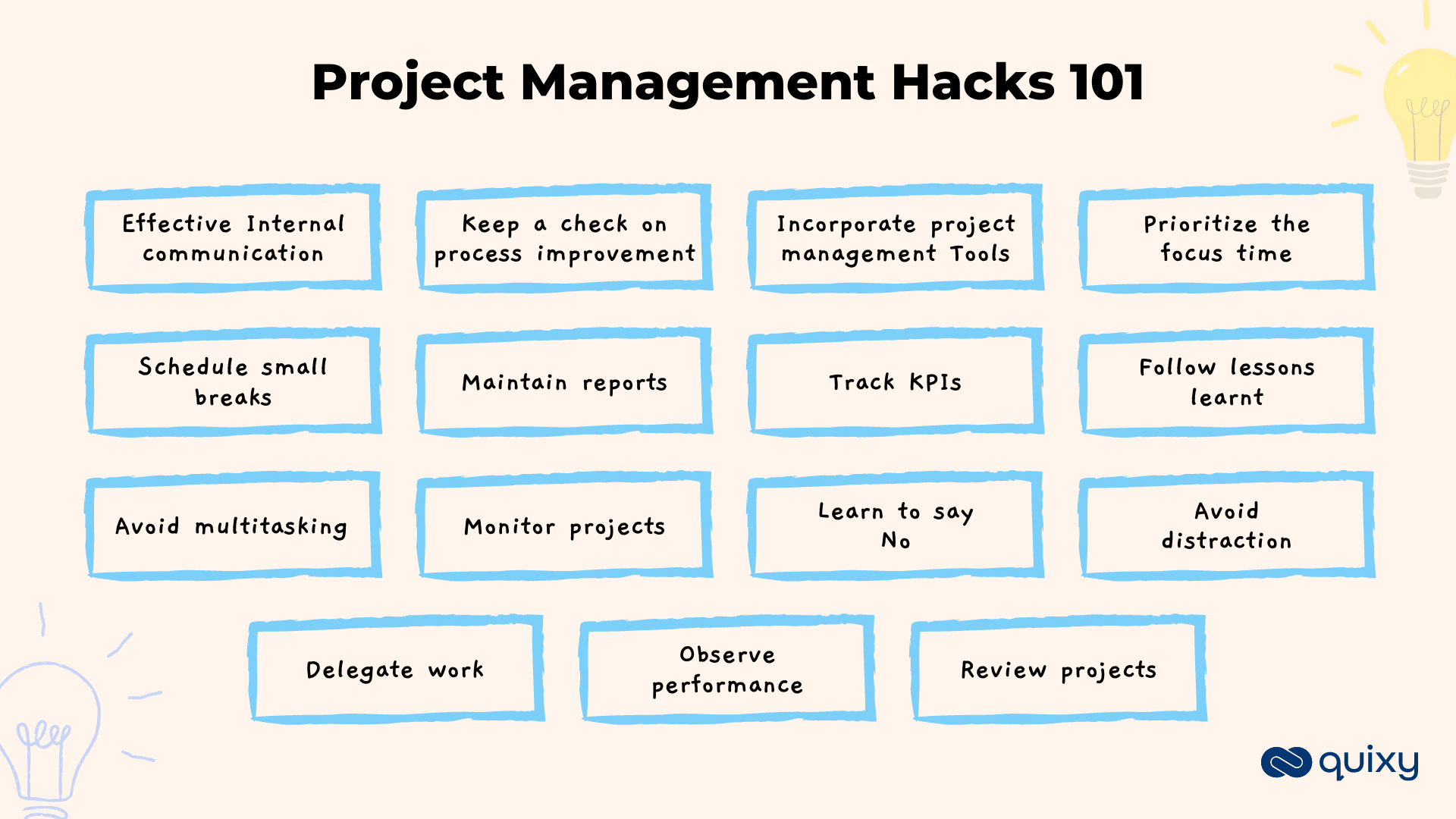
Do you ever wonder what makes the project and project managers successful? It is the combination of managerial skills and software tools. A successful project is linked to a few factors like the goal being well-understood by the team member, the project manager being open to suggestions, and putting the right time and effort into the project.
Read on to unbox a smarter approach to greater productivity.
Know and Incorporate Project Management Hacks
Now you must be wondering why there is a need to know and apply these project management hacks to your project. Questions like what are some of the most effective ways a management can improve the productivity of his or her team or how to increase productivity can arise in a project manager’s head. Knowing a few hacks that may seem less important at first but prove to be a key to building a successful project right from strategizing to completion at the end.
Here are the 15 project management hacks that will improve your team’s productivity.

1. Internal communication is the key!
The first and foremost step towards effective project management is to communicate the goal or objective that was set initially. The project managers continuously strive to pick a goal and plan a roadmap to achieve it promptly and effectively.
Communication is the key hack for every project. The project managers communicate the goal with the team and provide them with a vision of achieving personal as well as organizational goals. Each member must be familiar with and conscious of the project.
2. Keep an eye on process improvement
Project managers should always maintain a process improvement mindset. For say, when you’re working on something, hold on for a second, watch out for your process, and reconsider whether there is a simpler and more efficient way to achieve the goal. For instance, is this step required? Can this be done more effectively? etc.
With this mindset, teams can avoid creating unnecessary spreadsheets, replicating steps, and adding unnecessary goals to their to-do list.
Also Read: Revamp Project Management with No-Code
3. Incorporate project management tools for greater advantage
This is one of the most significant project management hacks because there is already a plethora of robust project management and social collaboration tools available, such as Google Calendar, Asana, Slack, Trello, and Facebook Workplace, for different project sizes and models.
Project managers must get familiar with and use these Project Management software so that they and your team can synchronize information across platforms effectively and efficiently. 77% of the highly effective teams use project management tools. These tools will undoubtedly save you time and effort because they allow you to communicate the information and track the progress of the team.
4. Do not flood your calendars– Prioritize the focus time
Project managers need not set and attend every goal or meeting in a day by the way of flooding their calendars. As this will probably reduce your as well as your project’s efficiency.
Try to attend to a specific number of tasks at hand, say three, in a day, and the leftover time should be your focus time. This focus time will keep you organized and help you to contribute to further planning.
5. Schedule small breaks for yourself and your team
Time flies by between frequent messaging, follow-ups, and long meetings. However, amidst these, it is necessary to take small breaks. This small break may include setting your computer aside, going outside, and breathing fresh air. Fresh air brings fresh energy and fresh ideas.
Working continuously makes you feel bored and reduces your efficiency. It is highly recommended for everyone, to take a 5–10-minute break from work and reactivate themselves for greater efficacy. Because if you take care of yourself, you contribute more to work.
Also Read: Automation Glossary: Master the A to Z of Automation
6. Maintain weekly or fortnight reports
Keeping track of your project is essential. According to a study 54% of the projects fail to effectively track the KPIs, ROI and status. Communicate with the team members and ask about their individual views and the status of the project. Asking out individuals’ opinions will help the project manager not only in looking for every employee’s progress but also the progress of the project.
Try to maintain weekly or fortnight reports using project management software that passes on the information to higher authorities promptly and easily.
7. Keep a tab on numbers
With maintaining the weekly reports, also keep a track of numbers. Numbers refer to the budget spent so far, time reports, number of tasks left, team velocity, holidays, leaves, resourcing until the project launch, etc.
Keeping a track of numbers will make it easy for project managers to assess the changes to avoid potential losses. Time and budget reports are critical for identifying and communicating issues and updating the client on the project’s progress.
8. Communicate the lessons learned during the project
Everything you do earns you a lesson, and that lesson must be highlighted. Rather than deferring until the end, lead two or three short lessons learned throughout each project. Determine what is and is not working, and assist team members in changing course when necessary.
Furthermore, changing the procedures will improve ongoing project quality, improving customer satisfaction as you provide status updates to clients.
Also Read: Best Construction Project Management Software
9. Avoid Multitasking to boost team performance
Studies suggest that multitasking can be harmful. It not only interrupts your current tasks but also stops you from focusing. When a project requires focused attention, multitasking will only delay it even further. Compare various projects side by side and decide how best to allocate resources across them.
The key to project management is to be productive, and you can only be productive when you are focused on one-task at a time.
Also Read: How Businesses can Supercharge Project Management with No-Code Apps
10. Plan and monitor departmental projects
Establish a meeting agenda so that everyone can stay on schedule and be ready to speak when their turn comes. To ensure that everyone is aware of their responsibilities, managers should also take notes and distribute them after the meeting.
Create and maintain a project tracking system. Although it may seem like more work, it streamlines future obligations and ensures that everyone is aware of their role in the work. Additionally, it will make them more responsible and accountable for their role in the project.
11. Do not underestimate the power of “No”
Although the project managers are conscious and responsible for their jobs, they might care less about outside factors that may cost them their time. These outside factors may include an urgent meeting or something that’s beyond their means. Ignoring or belittling these outside factors may eat your time.
For instance, the work that requires one hour may end up eating up your four hours because the factors ignored at the right time are the underlying conditions causing such a situation. Watch out for such conditions, learn to deny things that eats up your time and are not effective to your project.
Also Read: Project Management Strategy: Discover the Key to Project Success
12. Distraction may lead to disruption
While you prepare a project management strategy for your upcoming project, you should also create a distraction list. The distraction list may comprise social media, noisy work environment, colleagues, long breaks, binge-watching, etc.
It is highly believed that distractions lead to disruption. By disruption we don’t mean you will end up bombing your project, instead, it means distractions can affect your office hours, your efficiency, and time. And you know, project managers are the main face of the project so they somewhat become the ideal for other members. Make sure you list all the distractions and avoid them during your hours of efficacy.
13. Learn to delegate work
There is a category of work that is ‘Urgent but unimportant.’ The category encompasses tasks like scheduling meetings, taking interviews, etc. Most project managers believe they can do these as the tasks are easy and they feel needless to delegate them to other team members. But these tasks pile up and cause workload and stress.
However, you can hire a freelancer or virtual assistant for such tasks as it is very important for you to save time for critical things.

14. Observe your team’s performance
This may seem obvious, but simply talking with them can help project managers get to know their team members better. Inquire about how they are doing at work and in life.
Performance in the workplace can be greatly enhanced by checking in with your team. Engagement increases trust, and a team that has mutual trust functions well. Team members will feel more at ease talking to project managers and other team members about small issues.
15. Once your project is finished, review it
One of the project management hacks that can teach you and help your next project succeed is this one. Project reviews are a great way to spot problem areas and come up with solutions to stop the mistakes from happening again on your subsequent projects.
You can create a summary of your project and ask yourself about what things went well, what areas can be improved, what procedure didn’t work, what can you do now, etc. This will create a scope for improvement in your next project and earn you time, effort and cost.
Hacks+Technology: Smarter Approach
Understanding and applying these 15 hacks will boost the efficiency and performance of the team which in turn leads to successful projects and effective team management.
Using smart technology to reduce manual pressure is today’s approach to carrying on things. For instance, using project management software for maintaining records, checking team performance, and communicating with clients.
Quixy is a powerful no-code project management solution that can help your business streamline, track, and manage projects in your business. Get Started Today! Empower your organization with automation and customized app development without coding.
Frequently Asked Questions(FAQs)
What are project management tips?
Project management is like a puzzle. Here are some tips to help you put the pieces together: Start with a clear plan, communicate often, track progress, and stay flexible.
What are the secrets of successful project management?
Successful project management involves clear goals, a strong team, good communication, smart planning, and staying adaptable. But the real secret is learning from each project to do even better next time.
What are the 5 C’s of project management?
The 5 C’s are like building blocks for successful projects:
Communication: Keep everyone talking.
Collaboration: Teamwork makes the dream work.
Coordination: Keep things organized.
Control: Keep tabs on progress.
Change Management: Be ready to adapt.
What are the 5 P’s of project management?
The 5 P’s help steer your project ship:
Purpose: Know your project’s why.
Plan: Create a roadmap.
People: Assemble the right team.
Process: Define how you’ll get it done.
Progress: Keep an eye on how it’s going.
Subscribe
Login
Please login to comment
0 Comments
Oldest















